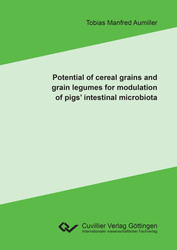| Areas | |
|---|---|
| Serie de libros (97) |
1381
|
| Nachhaltigkeit |
3
|
| Gesundheitswesen |
1
|
| Letra |
2369
|
| Ciencias Naturales |
5408
|
| Matemática | 229 |
| Informática | 319 |
| Física | 980 |
| Química | 1364 |
| Geociencias | 131 |
| Medicina humana | 243 |
| Estomatología | 10 |
| Veterinaria | 108 |
| Farmacia | 147 |
| Biología | 835 |
| Bioquímica, biología molecular, tecnología genética | 121 |
| Biofísica | 25 |
| Nutrición | 45 |
| Agricultura | 1005 |
| Silvicultura | 201 |
| Horticultura | 20 |
| Ecología y conservación de la tierra | 148 |
| Ciencias Ingeniería |
1795
|
| General |
98
|
|
Leitlinien Unfallchirurgie
5. Auflage bestellen |
|
Erweiterte Suche
Potential of cereal grains and grain legumes for modulation of pigs’ intestinal microbiota (Tienda española)
Tobias Aumiller (Autor)Previo
Indice, PDF (79 KB)
Lectura de prueba, PDF (140 KB)
Native carbohydrate fractions of major dietary components in pig nutrition, such as dietary fiber, resistant starch and oligosaccharides in whole cereal grains or grain legumes appear to be appropriate to manipulate the porcine gut microbiota. Therefore, the objective of this thesis was to evaluate effects of differences in carbohydrate composition of cereal grains, grain legumes and feed supplements on the intestinal microbiota in pigs. Based on a comprehensive literature research, an overview on the current research on the effect of whole grain cereals and grain legumes as well as their by-products on the pigs’ intestinal microbiota in relation to their carbohydrate composition was given. An in vivo experiment was carried out to determine the effects of 8 recently introduced genotypes of barley or wheat on ileal and fecal microbiota of grower pigs by means of quantitative real-time PCR. In addition, in a second experiment the effect of ultra-fine ground fibers from wheat, lupins and peas in comparison to inulin and basal substrates on the microbiota composition and formation of microbial metabolites was determined in vitro using the modified Hohenheim Gas Test. In agreement with previous studies, the potential to modulate the pigs’ intestinal microbiota with cereal grains and feed supplements based on cereal grain or grain legume fibers was shown. However, it was not possible to assign the observed effects on the bacterial groups to the dietary carbohydrates known to influence the intestinal microbiota, such as arabinoxylan or β-glucan.
| ISBN-13 (Impresion) | 9783736990944 |
| ISBN-13 (E-Book) | 9783736980945 |
| Formato | A5 |
| Idioma | Inglés |
| Numero de paginas | 164 |
| Laminacion de la cubierta | mate |
| Edicion | 1. Aufl. |
| Lugar de publicacion | Göttingen |
| Lugar de la disertacion | Hohenheim |
| Fecha de publicacion | 10.09.2015 |
| Clasificacion simple | Tesis doctoral |
| Area |
Agricultura
|
| Palabras claves | pig, intestinal microbiota, cereal grains, dietary fiber |








